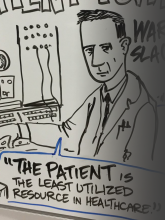Psychological predictors of subsequent medical care among patients hospitalized with cardiac disease.
| Title | Psychological predictors of subsequent medical care among patients hospitalized with cardiac disease. |
| Publication Type | Journal Article |
| Year of Publication | 1996 |
| Authors | Levine JB, Covino NA, SLACK WV, Safran C, Safran DB, Boro JE, Davis RB, Buchanan GM, Gervino EV |
| Journal | J Cardiopulm Rehabil |
| Volume | 16 |
| Issue | 2 |
| Pagination | 109-16 |
| Date Published | 1996 Mar-Apr |
| ISSN | 0883-9212 |
| Keywords | Aged, Boston, Coronary Disease, Depression, Female, Follow-Up Studies, Forecasting, Health Care Costs, Hospitalization, Humans, Male, Middle Aged, Patient Readmission, Prospective Studies, Severity of Illness Index |
| Abstract | BACKGROUND: There have been numerous reports indicating a relation between psychological distress and coronary artery disease. The authors tried to determine whether psychological distress in patients hospitalized for coronary artery disease is associated with the amount of medical care required after discharge.METHODS: Using a prospective clinical cohort, 210 patients who had been admitted for myocardial infarction (n = 67), percutaneous transluminal coronary angioplasty (n = 75), or coronary artery bypass grafting (n = 68) were followed for 6 months. Index psychological status was determined from questionnaires measuring depression and anxiety. Disease severity was assessed by the index hospitalization medical record of left ventricular ejection fraction, number of stenotic vessels, and number of noncardiac comorbidities. The amount of subsequent medical care delivered was based on the number of days of rehospitalization for cardiac-related illness and for any reason within 6 months after discharge. This was determined from a combination of computer medical record and patient self-report.RESULTS: The authors first determined that both psychological depression and disease severity each predicted days of rehospitalization. (Anxiety was not predictive of rehospitalization.) Next, disease severity was controlled for using partial correlation, and depression was still predictive of rehospitalization. Finally, the authors combined the predictor variables using a regression model to predict rehospitalization. Depression was a significant main effect in all models predicting rehospitalization.CONCLUSIONS: Psychological depression appears to be an important predictor of rehospitalization among persons who have been admitted with coronary artery disease. |
| URL | https://journals.lww.com/jcrjournal/Abstract/1996/03000/Psychological_Predictors_of_Subsequent_Medical.5.aspx |
| Alternate Journal | J Cardiopulm Rehabil |
| PubMed ID | 8681155 |




